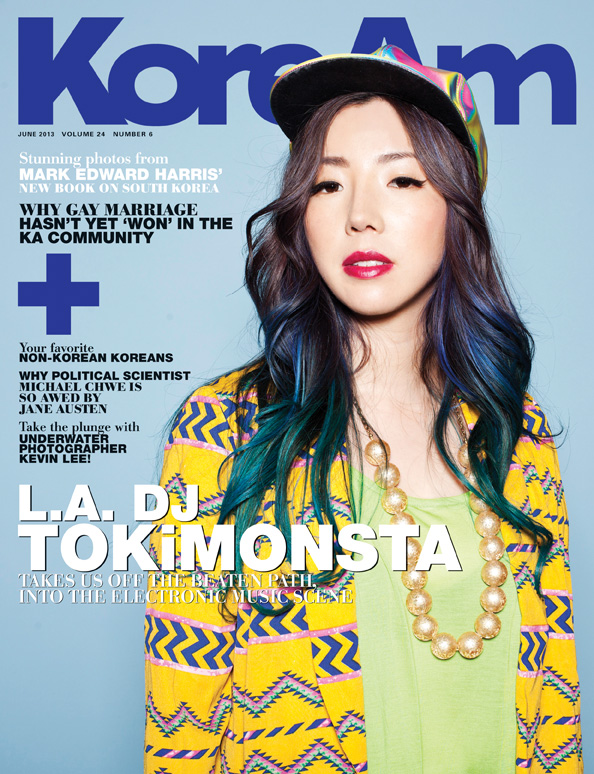On her latest record, L.A. DJ and beatmaker Jennifer Lee, a.k.a. TOKiMONSTA, urges us to do just that. It’s a strategy that’s worked for her so far.
by EUGENE YI
photo by NIKKO LAMERE
On an unseasonably warm, early spring night in Brooklyn, a fight broke out before the TOKiMONSTA show—one of those elaborate displays of competitive temerity that took 20 minutes to, finally, ignite. It started with a photographer trying to sneak in a bottle of wine, leading to the predictable pas de deux, and ending with a bottle of water being thrown from a passing car at the bouncer. There is no rage like bouncer rage, and as I watched him dash to his car, rev his engine and sear skid marks onto the pavement, I wondered aloud how any show could possibly follow what had just happened.
“No, you can’t go. TOKiMONSTA is sooo good,” said a blonde-bobbed woman behind me, dressed in what could be described as post-hipster understated Americana. I couldn’t help but wonder if it was mere coincidence that a female fan would happen to be doing the exhorting outside a performance by TOKiMONSTA, née Jennifer Lee, from Torrance, Calif., an Asian female DJ/music producer in the largely non-Asian, decidedly male world of L.A.’s beat scene, and electronic dance music at large.
This, of course, raises the usual questions that have framed the majority of the press coverage about TOKiMONSTA. It’s all about the music, and race and gender shouldn’t matter, except, of course, when they do. No one wants to be just a Korean American musician, or just a female musician. But in the reams of coverage she’s garnered over the years, the most common questions have been about the toki(it’s the Korean word for rabbit), and “how does it feel to be a female,” she said during a recent phone interview. There was a hint of weariness when answering the old questions about gender and race—which is completely understandable.
“In the beginning, I wanted to avoid placing emphasis on my gender and my ethnicity because I didn’t want it to be a gimmicky thing. Like I’m trying to attract people to my music with these other non-related aspects of who I am,” Lee said. When she was starting out, as one of the only woman showing up to Project Blowed’s Beat Cypher nights for amateur producers in South Los Angeles, the last thing she wanted to receive was acceptance because she happened to be a she. In early press stills, a rabbit mask obscured her face. The mask is a common tic in the electronic music world (think deadmau5 or Daft Punk), but on Lee, it seemed to emphasize a point. Just listen to the music.
As Lee’s career has progressed, she’s been an interesting case study. She’s an artist with a very specific identity, who never sought to play her gender up, nor did she ever seek out a specifically Asian American audience. What she is, of course, is a Korean American woman from Los Angeles, one of the few places in the world where one isn’t forced to be either a faceless beat-making humanoid, or the deterministic product of a pair of XX chromosomes and a Korean upbringing. But to the rest of the world, her identity became the lens through which to view her. Despite that, she’s been an artist who has strived to see herself as a whole, while the world has sought to impose its notions of Korean-ness and femininity upon her. But over time, her views have evolved.
“Now I want to show my identity and who I am because I feel as though my music can help other females or Asian Americans who are trying to do music,” she said. “It’s kind of unavoidable. I am what I am.”
In a sense, her new outlook is the result of her success. By going from being a novelty to being a fixture, she’s put herself in a position where her accomplishments can no longer really be threatened by the particulars of her biology.
Just a few years ago, the Low End Theory night at the Airliner, in the Lincoln Heights neighborhood of Los Angeles, burst onto the consciousness of electronic music fans through the attention of tastemaking BBC DJ Mary Ann Hobbs, who declared it “the most exciting electronic music scene on the planet.” The scene, a close-knit collective of beat eccentrics, suddenly became a Scene. TOKiMONSTA, as the lone female, defaulted into titles like “the Queen of the L.A. Beat Scene” and “the First Lady of Brainfeeder,” the label associated with Flying Lotus, the scene’s brightest star.
Since that time—an eternity in the electronic music world—the crowds at the Airliner have gotten bigger, and a stable’s worth of heretofore unknown artists have become known quantities, an unexpected development for musicians whose work, to the uninitiated, can seem dense, forbidding and perplexing. During that time, TOKiMONSTA has established herself, living the life of a working musician, filling up her SoundCloud page, touring and, as she puts it, “slowly succeeding.” She just released a new album—not on Brainfeeder, but Ultra, a dance-focused label that has greater resources to promote her album, the symphonic Half Shadows, inspired by Haruki Murakami’s moody novel Kafka on the Shore. Lee also toured last year with some of the biggest stars of electronic music, including mainstream tastemaker Diplo, dubstep kingpin Skrillex and the electronic singer-songwriter Grimes.
In that time, Lee has seen plenty of the flipside of pigeonholing: identity-based fandom, with people interested in her solely because of her demographic particulars. Modern technology has incentivized fandom in peculiar ways; the expectation of closeness and relatability to artists has never been higher. It can lead to awkward interactions with fellow Korean Americans, who, speaking for myself, are some of my most and least favorite people.
“People talk to me in Korean, and it’s like, ‘Oh, OK, cool,’” she said, laughing. “[They’ll] say, ‘You’re Korean, I’m Korean, too.’ So it’s like, ‘Bravo,’” she added, equal parts salt and sweet, encapsulating the conundrum for many an artist of color.
Back on her home turf, though, as a Korean American from Los Angeles, she’s part of another scene as well. Los Angeles is one of the places where a creative community of Korean Americans can actually exist. It seems that, for TOKiMONSTA, the time she’s spent grinding away, “first lady” appellations and all, have allowed her to embrace her identity without it limiting her. In other words, she can just be her damn self. Which makes it natural that she would hold the release party for her new album at Kogi Truck creator Roy Choi’s A-Frame restaurant, with a menu curated by the Korean American chef himself.
“Everyone is kind of aware of everyone else. Korean Americans, especially. It’s not a big group of people,” said Lee.
The two had several friends in common, including the rapper Dumbfoundead, who seems to be able to play the role of an Asian American Kevin Bacon in the six degrees game. Choi and Lee expressed mutual respect for each other’s work, and when it came time to host a release party for her new album, she imagined what she termed a “social experiment.”
“It’s a dinner party … pairing music with food directly, without one being the backdrop to the other,” she said. “It’s not like eating a pizzawhile you’re [listening to] Jay-Z. Or it’s not like going to a five-star restaurant where they’re playing a little bit of music in the background. [It’s] letting both shine equally.”
Lee said she gave Choi no direction, and the new album allowed him to stretch a bit in creating Korean America’s first dinner party be-in. The album is more sonically diverse than her past work, four movements reflecting her growing ambition. “The first part of the album is a little more strange and a little more aggressive, and then transferred to a little more upbeat, then sweet and a little more spacey toward the end,” she said.
For the first course (strange/aggressive), Choi covered the tables with paper, upon which the servers threw pickles, ribs and shrimp. It was “kind of like a Jackson Pollock painting. It was almost his interpretation of my music through food. And it was really amazing,” said Lee.
A customized cocktail accompanied each course, so the DJ admits her recollection of the last couple of courses is a little bit blurrier. One imagines that by the time the last song, the ethereal “Moon Rise,” wobbled out of the speakers, with vocalist Jesse Boykins III moaning like a heartbroken, hyperarticulate Sade over woozy synths layered over everything from bird tweets, crickets and ominous clanking of some distant machine, the churros and gummy bears might’ve gone unnoticed.
“It’s one of the songs I like the most, and I wanted it to end with this really beautiful track. When [Boykins] sent me the vocals for it, I almost shed a tear. It was really beautiful,” said Lee.
Back at the Brooklyn show, two openers warmed the crowd up with their own sets, accompanied by the expected trippy visuals, their names occasionally flashing on the screen, helping to serve as identifiers until the main course, so to speak.
TOKiMONSTA emerged at last, and it was immediately apparent that she was in a different league. She’s gotten her reps in, it seems. The stuttering video behind her with “TOKiMONSTA” writ large seemed less to identify her than to affirm her stature, with shades of Elvis performing in front of his own name. There’s no way to know if she’d be any less famous if she weren’t female, or if she weren’t Korean American. I’ve spoken to some who became fans for those reasons, and many who were surprised to find out they were bobbing their heads to a Korean American woman’s music. But everyone who remained fans, everyone who was there at the show, stayed for the music. And as the crowd went crazy during a fast-moving set that climaxed with a remix of Miguel’s “Adorn,” nothing else seemed to matter.
At one point, she cut the music suddenly. “Shout out to my mom and dad in the crowd,” she said, to knowing chortles. “Now suhnoosheet.”
The music returned. Then cut again.
“I mean, ‘Some new sh-t,’” she said. “I can’t speak English.”
Music. Cut.
“I mean Engrish.”
Music.

This article was published in the June 2013 issue of KoreAm. Subscribe today! To purchase a single issue copy of the June issue, click the ”Buy Now” button below. (U.S. customers only. Expect delivery in 5-7 business days).













